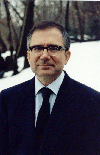Nobel laureates have reportedly been invited to a conference on parapsychology to be held at the University of British Columbia in Vancouver. The event, “A Meeting of Minds,” is to take place on July 15-16, 2007. The co-hosts are Jonathan Schooler and Dean Radin.
Invitees
Nobelists Kary Mullis and Brian Josephson have been mentioned as likely attendees. Elizabeth Loftus, member of the National Academy of Sciences, has confirmed her intention to attend. Richard J. Davidson, a neuroscientist at the University of Wisconsin who was included in Time magazine’s list of “the world’s most influential people” (see May 8, 2006 issue), was expected, but now likely will be unable to take part.
Some of the other invitees are said to be: Harvard psychologist, Daniel Gilbert; Duke professor of philosophy and neurobiology, Owen Flanagan; Princeton psychologist, Jonathan Cohen; Morris Freedman MD of the University of Toronto; Paul Rozin of the University of Pennsylvania Department of Psychology; and Ken Paller, psychologist from Northwestern University.
Paul Ekman, an expert on deception, reportedly served on the advisory committee, and Paul Werbos of the National Science Foundation was also mentioned in this capacity.
This is an “invitation-only” conference, apparently restricted to high-status scientists and selected “old guard” parapsychologists. A few academic members of CSI (nee CSICOP [Committee for the Scientific Investigation of Claims of the Paranormal] ) are also anticipated to be present.
Reportedly, over 80% of the invited participants are aging white males.
Funding
There is some money behind this meeting, and the expenses of the invitees are to be covered. Financial backing comes from several private donors, the Bial Foundation, the Samueli Institute, the Fetzer Institute, and the University of British Columbia.
Purpose
The expressed purpose of the conference is to explore why academia so actively avoids the paranormal despite the wide interest by the general public.
To acquaint the visiting scientists with the field and to facilitate discussion, parapsychologists will present evidence for the existence of ESP and review theoretical problems of the phenomena.
Commentary
Will this effort succeed? Let’s remember, it’s been 125 years since the founding of the SPR (Society for Psychical Research). Parapsychologists have published their work continuously since that founding. Innumerable scientists have learned of the research through books, journal articles, and conferences. Yet the field is now no closer to respectability than it was during the 19th century. Arguably, it is further from it.
Yet still today, many parapsychologists seem to believe that if they present their evidence objectively to other scientists, the broader scientific community will begin to accept them as legitimate members. Traditional scientific funding sources will welcome proposals, major journals will seek papers on psi, and conferences will regularly include symposia on paranormal topics. But such hope is forlorn.
Parapsychologists do not seem to realize that their field is inherently marginal. Psi phenomena are liminal, and they carry a taint, a stigma. This is nothing new. The stigma did not develop with the rise of modern science, nor with advent of the Enlightenment, nor with the Reformation. The stigma has been seen for thousands of years in hundreds of cultures. Attempts to directly engage psi has consequences—one being the continuing marginality of psychical research.
Until parapsychologists recognize this state of affairs, they will remain bewildered—and bitterly disappointed.
- - - - - - -
The information for this post came from a source who wishes to remain anonymous and from a short notice in the magazine Shift: At the Frontiers of Consciousness, No. 15, June-August 2007, page 40.
Wednesday, July 11, 2007
Nobel Laureates Invited to Parapsychology Conference
Labels:
liminality,
marginality,
Nobel laureate,
parapsychology
